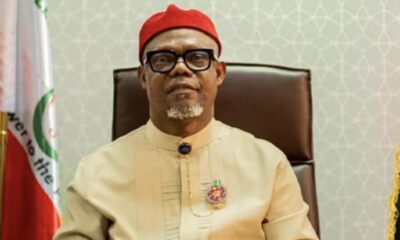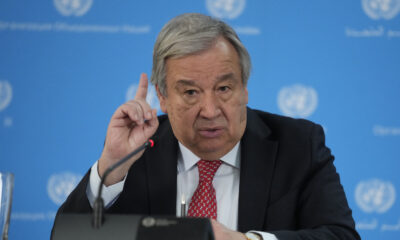International
Why Africa should stand by Ukraine against Russia – Foreign Minister

Dmytro Kuleba, Ukraine’s minister of foreign affairs said Thursday that there are at least three reasons for African countries to stand by Ukraine.
Speaking at a special press briefing organised by Africa Regional Media Hub, Mr Kuleba made reference to Africa’s colonial history by saying Africa should “understand very well how it feels to be attacked by a power that cannot abandon the idea of its supremacy over our nation and its colonial, imperialistic ambitions…”
Another reason, according to Mr Kuleba, is that if Russia succeeds in Ukraine, it will be a clear message to the entire international community and to all countries who want to attack their neighbours that there is no world order that can protect them.
“That the mighty can do whatever it wants to impose its will on the other’s part,” Mr Kuleba said.
The third argument, according to him, is the ongoing food security challenge. According to him, the longer the war lasts, the more difficult it would be to get agricultural produce to Africa.
He accused Russia of intentionally blocking its (Ukraine) seaports to foster a new wave of colonisation aimed at reconfiguring the global food system and making it more Russia-dependent than ever.
READ ALSO:
- Passport, NIN cast doubt over claim Ekweremadu ‘kidney donor’ is just 15
- Family suspects foul play as Akwa Ibom man dies after meal with lover
- Court rejects bail application of nursing mum’s abductor jailed 70 years
According to the World Economic Forum, 14 African countries depend on Russia and Ukraine for more than half of their wheat imports, while almost half the continent depends on imports for more than a third of their wheat.
Apart from the looming supply constraints, this crisis has already pushed food grain prices up by more than 25 per cent.
Mr Kuleba added that Russia’s attack on Ukraine’s agricultural infrastructure to inflict maximum damage on its food-producing capacity is deliberately inflicting damage on African states that rely on Ukrainian agricultural exports.
“I urge the world and all African states to work together and pressure Russia to allow a safe sea route for our food exports, ” he said, adding that African states have a crucial role in this.
African capitals matter and they do influence Russia’s position, the ogival said.
By preventing Ukraine from exporting its agricultural produce, Russia is trying to squeeze Ukraine out of its traditional markets in African countries, he added.
Thousands of people have been killed and millions of others displaced since Russia invaded Ukraine in February.
The invasion has been condemned by many countries as a violation of Ukraine’s sovereignty and the international order.
Russia called the invasion a ‘special military operation’ to rid Ukraine of neo-Nazis and protect Russia from NATO’s expansion to its borders.
Most of the countries that have condemned the invasion and declared support for Ukraine are Western countries and U.S. allies. Most African countries have been largely neutral on the matter preferring to call for peace rather than condemn Russia’s actions.
PREMIUM TIMES
International
Trump Imposes 15% Global Tariff Hours After Supreme Court Blocks Previous Tariffs

Trump Imposes 15% Global Tariff Hours After Supreme Court Blocks Previous Tariffs
President Donald Trump has announced a 15 % global tariff on imported goods just hours after the U.S. Supreme Court struck down his earlier tariff programme as unconstitutional. The decision marks a major escalation in U.S. trade policy and signals potential disruptions for global markets.
The Supreme Court, in a 6‑3 ruling, found that Trump overstepped his authority by using emergency powers under the International Emergency Economic Powers Act (IEEPA) to impose sweeping tariffs. The Court ruled that only Congress has the power to levy broad import taxes, effectively invalidating the president’s previous tariffs on most trading partners.
In response, Trump moved swiftly to raise tariffs under Section 122 of the Trade Act of 1974, which allows temporary import duties of up to 15 % for 150 days without congressional approval. Trump described the increase as “fully allowed and legally tested” and indicated his administration will explore additional legally permissible tariffs in the coming months.
READ ALSO:
- APC Wins Rivers Ahoada East State Constituency II Bye‑Election
- Opposition Weakens as Another Governor Eyes APC Move
- ₦13.7bn Payroll Fraud Claim Pits Audit Firm Against Osun Government
Official statements confirmed that the new tariff takes immediate effect, covering imports from all countries. The White House framed the move as a measure to protect U.S. workers and industries from unfair foreign competition, even as analysts warn it could increase costs for consumers and invite retaliatory trade measures from other nations.
Economic and Political Reactions
The Supreme Court decision and Trump’s rapid tariff escalation drew mixed reactions. Business groups and economists cautioned that higher tariffs could disrupt supply chains, increase inflation, and slow economic growth. Some companies have already filed legal claims seeking refunds for previously collected tariffs.
Meanwhile, global trading partners are monitoring the situation closely, warning that the 15 % tariff could strain diplomatic and trade relations. Supporters of Trump’s trade stance argue that tougher tariffs are necessary to address U.S. trade deficits and protect domestic manufacturing.
Section 122 authority expires after 150 days unless Congress extends it, meaning the long-term enforcement of the 15 % tariff may require legislative backing. Analysts say the move highlights the tension between executive authority, judicial oversight, and congressional power in U.S. economic policymaking.
Global Implications
Markets around the world have reacted cautiously to the announcement. Some trading partners may implement retaliatory tariffs, while global supply chains could face disruptions, particularly in consumer electronics, automotive, and industrial sectors. Analysts predict that ongoing uncertainty will affect trade flows and investment decisions in the short term.
Trump’s announcement comes at a politically charged moment, with midterm elections and international trade negotiations influencing domestic and global economic strategies. The move underscores the complex interplay of law, politics, and economics in U.S. trade policy.
Trump Imposes 15% Global Tariff Hours After Supreme Court Blocks Previous Tariffs
International
UK Court Hands Life Sentence to Nigerian Teen for Knife Attack Killing

UK Court Hands Life Sentence to Nigerian Teen for Knife Attack Killing
A Nigerian teenager residing in the UK, Jackson Uwagboe, has been sentenced to life imprisonment for the murder of 21-year-old Robert Robinson, following a brutal knife attack in Lewisham, London. The sentencing was delivered at the Old Bailey on Wednesday.
The Metropolitan Police confirmed that 19-year-old Uwagboe of Hamilton Street, Lewisham, was found guilty of murder on Tuesday, 10 February 2026, in a case stemming from a dispute over a stolen bicycle. The court ruled that Uwagboe must serve a minimum of 21 years before he can be considered for parole.
Uwagboe’s co-defendant, Eromosele Omoluogbe, 24, was earlier convicted of perverting the course of justice after assisting Uwagboe in attempting to flee to Nigeria via Heathrow Airport.
READ ALSO:
- Ogun Gov Rewards Nigeria’s Best Primary School Teacher with Car, Bungalow
- Police Bust Gang Armoury, Arrest Two Suspects in Delta
- Peter Obi Launches ‘Village Boys Movement’ to Rival Tinubu’s City Boys Ahead of 2027
Prior to this sentencing, two other men, Ryan Wedderburn, 18, and Kirk Harris, had already been convicted and handed life sentences in May 2025 for their roles in the same murder.
Detective Inspector Neil Tovey, who led the investigation, described the incident as a “brutal and sustained attack”. He said, “Robert was subjected to a brutal and sustained attack by a group of men armed with knives. He was unarmed, already wounded, and on the ground when Uwagboe attacked him. Today’s verdict brings justice for Robert Robinson and his family.”
The case has drawn attention to youth violence, knife crime, and gang-related activity in London, as well as the challenges faced by law enforcement in preventing violent disputes over seemingly minor disputes such as bicycle theft.
The sentencing underscores the UK judicial system’s approach to serious violent crimes, ensuring that perpetrators face long-term incarceration while providing a clear minimum term before parole consideration.
UK Court Hands Life Sentence to Nigerian Teen for Knife Attack Killing
International
UK-Based Nigerian Gets 13-Year Jail Term for Forcing Girlfriend to Abort Pregnancy

UK-Based Nigerian Gets 13-Year Jail Term for Forcing Girlfriend to Abort Pregnancy
A UK-based Nigerian man, Adeleke Adelani, has been sentenced to more than 13 years’ imprisonment for unlawfully aborting the pregnancy of his former partner after coercing her to take abortion medication on Valentine’s Day.
The offence occurred in 2020 when Adelani, then 28 years old, deceptively invited the woman — whose identity is legally protected — to his residence in Letterkenny under the guise of discussing the future of her pregnancy. Evidence before the court showed that the victim was nine weeks pregnant at the time of the incident.
Prosecutors told the court that upon her arrival, Adelani threatened the woman with violence and forced her to ingest five tablets of misoprostol, a drug used for medical abortions, thereby causing the unlawful termination of the pregnancy. The court heard that the defendant had researched the medication in advance and acted deliberately. The victim later contacted authorities, leading to Adelani’s arrest by Irish police.
READ ALSO:
- Lawmaker Jailed for Mocking President in Facebook Post
- Police to Arrest TikToker Mirabel After She Recants False Rape Claim
- Tinubu Reduces Reliance on U.S, Strengthens Defence Partnerships With Turkey, EU
At the time of the sentencing, Adelani was already serving a separate seven-year prison sentence for an unrelated offence. He had initially been due to stand trial last year but pleaded guilty before jury selection began, accepting responsibility for the charges brought against him.
During the sentencing hearing at the Letterkenny Circuit Court, the victim delivered a powerful impact statement, explaining that although she had chosen to forgive Adelani, the consequences of his actions would remain with her for life.
“I have forgiven the defendant,” she told the court. “That forgiveness does not mean what he did was acceptable. It means I refuse to let what he did continue to control my heart and my life. When he wrongfully imprisoned me and caused the termination of my nine-week pregnancy, he took far more than my freedom. He took my child. He took my sense of safety. He took a future that I had already begun to plan and love.”
In a letter read aloud in court, Adelani apologised to the victim, accepted full responsibility for his actions, and expressed remorse for the pain and trauma he caused.
Delivering judgment, John Aylmer described the crime as deliberate, premeditated, and deeply traumatic, stressing that it involved coercion, abuse, and a serious violation of trust. The judge sentenced Adelani to 11 years in prison, with the final two years suspended, for causing the unlawful termination of a pregnancy, and an additional five years, with the last 12 months suspended, for assault causing harm.
The sentences are to run concurrently, adding to Adelani’s existing term and resulting in an overall prison sentence exceeding 13 years. The case has reignited debate in Ireland and internationally about reproductive coercion, domestic abuse, and violence against women, with legal observers describing it as one of the most serious cases of its kind in recent years.
UK-Based Nigerian Gets 13-Year Jail Term for Forcing Girlfriend to Abort Pregnancy
-

 Politics2 days ago
Politics2 days agoPeter Obi Launches ‘Village Boys Movement’ to Rival Tinubu’s City Boys Ahead of 2027
-

 International3 days ago
International3 days agoCanada Opens New Express Entry Draw for Nigerian Workers, Others
-

 News2 days ago
News2 days agoPolice to Arrest TikToker Mirabel After She Recants False Rape Claim
-

 International2 days ago
International2 days agoEpstein, Ex-Israeli PM Named in Alleged Profiteering From Boko Haram Crisis
-

 Education12 hours ago
Education12 hours agoUTME: JAMB Clarifies Position on Hijab During Biometric Capture
-

 metro3 days ago
metro3 days agoOsun Awards 55.6km Iwo–Osogbo–Ibadan Road Project to Three Contractors
-

 Politics3 days ago
Politics3 days agoUpdated: Rivers Senator Mpigi Barinada dies at 64
-

 metro3 days ago
metro3 days agoOndo Monarch Killed as Bandits Strike Akure North















